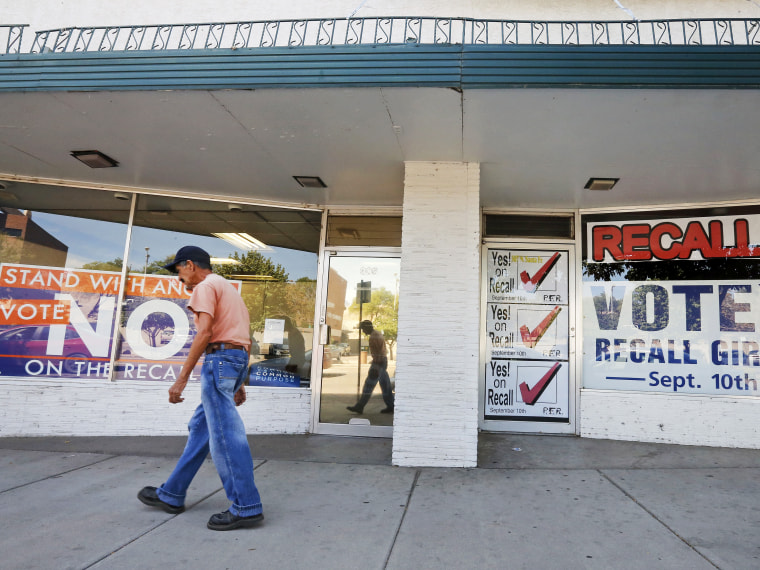Republicans and gun rights activists scored a major victory in Colorado on Tuesday when they recalled two Democratic state senators, including Senate President John Morse, over their votes for gun control legislation. Democrats still narrowly control the state Senate in addition to the House and the governor's mansion, but do the results signal a red tide in 2014?
Not so fast. While the recalls are a boon to the pro-gun cause, some Republican and Democratic strategists say the jury's out as to whether they herald significant GOP gains in the state -- especially in the governor's race.
"In terms of the governor, it's not good for him, but I don't know how bad it is," Katy Atkinson, a Republican consultant in Denver, told MSNBC.
Atkinson said Republicans might pick up some seats in the state legislature thanks to overreach from the progressive Democratic legislature this year on a variety of issues. But she noted neither of the recalled senators represented the Denver area or its suburbs, where Democratic candidates for statewide office draw the bulk of their winning margins and where the gun rights cause is less powerful.
One Democratic strategist pointed out that while the recall elections were low-turnout affairs requiring residents to vote in person, turnout should be far higher in the 2014 November races when voters receive ballots automatically by mail. About 74% of Colorado voters cast their ballots by mail in 2012.
The biggest cause for skepticism, though, is Republicans' trail of blown opportunities in the state over the last decade. Colorado leaned red for a generation until 2004, when well-funded Democratic candidates finally retook the state legislature. Republican candidates have lost every race for senate, governor, and president since and Democrats now enjoy unified control of the state government.
What happened? For one thing, the makeup of the electorate changed dramatically. Latinos increased their share of the vote from 8% in 2004 to 14% in 2012 while supporting Democrats by huge margins. An influx of socially liberal residents, especially from California, helped grow Democrats' advantage in Denver. And suburban women, who are considered the prize swing vote, moved towards Democrats as well.
As the environment shifted, the GOP's choice of candidates only exacerbated the problem. In 2010, for example, Senate candidate Ken Buck scared off Latinos with his hardline immigration record, turned off moderates by comparing homosexuality to alcoholism, and alienated women by mocking his primary opponent's "high heels." Tom Tancredo, the GOP's de facto gubernatorial nominee on a third party line, did even worse with Latinos thanks to his leading role in the national anti-immigration movement. Both of them lost despite a spectacular GOP wave that washed out Democrats across the country.
As of now, there's a decent chance that Buck and Tancredo will be party's nominees for senate and governor again in 2014. And while Hickenlooper's poll numbers are looking rough at the moment, there's little reason to think 2014 will be as favorable an environment for Republicans as the one they enjoyed in 2010. That has some Republicans nervous that they may be missing a legitimate shot at blocking his re-election.
"Those were big recall victories last night which could spell trouble for Hickenlooper and [Senator] Udall, but not if we nominate Tancredo and Buck," former Colorado GOP chair Dick Wadhams told NBC's First Read.
According to Atkinson, rural Democratic legislators might think twice about straying too far from gun rights activists on future legislation. But when it comes to the governor? Demographics and a lack of candidates still make it a rough climb.
"They have to have somebody voters see as a credible alternative," she said. "That continues to be a problem."
